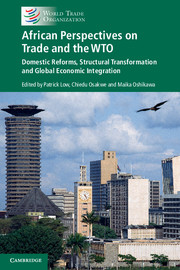 African Perspectives on Trade and the WTO
African Perspectives on Trade and the WTO from Part I - The Future of the Multilateral Trading System: Perspectives from African Policy-Makers and Partners
Published online by Cambridge University Press: 27 October 2016
Nigeria is the largest economy in Africa, with a GDP in excess of US$ 500 billion, dependent on oil and gas exports for the bulk of government revenues as well as foreign exchange. Its growth – which averaged about 7 per cent in the decade between 2005 and 2014 – has in recent years been driven by the non-oil sectors: services, agriculture and manufacturing. The principal challenge for the President Buhari administration, which took office in May 2015, is to build on this trend, by diversifying export income and the sources of government revenues, as well as kick-starting the long-overdue task of industrializing the Nigerian economy. One of the goals of this approach is to achieve robust, stable and predictable growth, free from short-to-medium-term cycles of boom and bust.
The strategy for Nigerian economic diversification is based on sustained domestic institutional and structural reforms, the Nigeria Industrial Revolution Plan (NIRP), a sectoral focus on core services (finance, telecommunications, transportation, energy), investment in infrastructure, support for manufacturing and for small and medium-sized enterprises and access to enlarged markets through integration into regional and global value chains.
Coupled with these priorities is the premium accorded to high-quality governance, plugging fiscal leakages and frontally addressing the systemic challenge of corruption. Successful implementation will require buy-in and ownership by Nigerians, support from Nigeria’s external partners and patience from investors in ongoing reforms.
To save this book to your Kindle, first ensure [email protected] is added to your Approved Personal Document E-mail List under your Personal Document Settings on the Manage Your Content and Devices page of your Amazon account. Then enter the ‘name’ part of your Kindle email address below. Find out more about saving to your Kindle.
Note you can select to save to either the @free.kindle.com or @kindle.com variations. ‘@free.kindle.com’ emails are free but can only be saved to your device when it is connected to wi-fi. ‘@kindle.com’ emails can be delivered even when you are not connected to wi-fi, but note that service fees apply.
Find out more about the Kindle Personal Document Service.
To save content items to your account, please confirm that you agree to abide by our usage policies. If this is the first time you use this feature, you will be asked to authorise Cambridge Core to connect with your account. Find out more about saving content to Dropbox.
To save content items to your account, please confirm that you agree to abide by our usage policies. If this is the first time you use this feature, you will be asked to authorise Cambridge Core to connect with your account. Find out more about saving content to Google Drive.